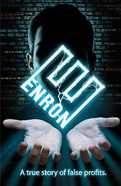Enron Playwright Lucy Prebble on Turning Corporate Collapse into Broadway Razzmatazz
About the author:
Lucy Prebble knows how to get people talking. The young British scribe won the George Devine Award and the Critics' Circle Award for Most Promising Playwright for her debut play The Sugar Syndrome at the Royal Court Theatre. Then she got tongues wagging as the creator of TV’s Secret Diary of a Call Girl, a titillating show based on the tales of a real-life anonymous London escort. Now Prebble is making her Broadway debut with her second play, Enron, starring Norbert Leo Butz, Gregory Itzin, Marin Mazzie and Stephen Kunken. Directed by Rupert Goold, the show is already a hit across the pond. (After premiering at the Minerva Theatre Chichester and enjoying a limited run at the Royal Court, it transferred to the West End, where it is currently playing at the Noel Coward Theatre.) Here, Prebble explains why the fall of an American energy company and the scandal surrounding it is perfect subject matter for the theater. ![]()
I am writing this a few hours away from the first preview on Broadway of my play Enron. Actors sing a barbershop quartet in the basement; on stage Norbert Leo Butz discusses antithetical thoughts in his lines with director Rupert Goold; in the audience a ventriloquist’s dummy representing Arthur Andersen sits propped up in the front row. This is rehearsal of Enron, a play I wrote about accounting that has somehow become a big, epic show filled with light, color and razzmatazz.
It’s a strange subject for a play, the world of finance. And yet, in a way, there’s nothing more theatrical. Finance is built around illusion and metaphor. These are things the stage can do well. In business, we are asked to accept that things that don't actually exist (stocks and shares, financial instruments) are real. We feel their power, even whilst knowing they do not literally exist. In a theater, we ask an audience to accept the same thing.
I decided to write about Enron after reading about the trials in Houston in 2003-2004. The story of a visionary CEO, adored by the marketplace, concealing a secret and eventually called to account for his crimes seemed to follow the arc of a classical dramatic tale. The finance was secondary. But, of course, I had to understand the finance of it, so four years ago I began the years of research into what had caused (at that time) the largest corporate collapse in history.
Little did I know that a few years later, during the show’s rehearsals in London, economics would become front-page news. AIG, General Motors, Lehman Brothers—every day it seemed more of the financial world was collapsing around our ears. And, of course, I wondered if the story of Enron had any relevance anymore. But what I’ve learned is that it was exactly the story to be telling. More than any other, the story of Enron illuminates our present economic woes. It was the precursor, the warning, and audiences seemed to respond passionately to being led through the numbers, in the form of an entertaining narrative rather than dry journalism.
One thing any economist will tell you is that financial bubbles have existed all through time, not just the last couple of years. There is something human, something personal, even emotional, about a financial bubble. As a species, we create them and then condemn them, again and again. And the world of finance, for all its opaque intimidation, is at its center about people. A marketplace is just a group of people behaving, after all. Just like a workplace, or a family. And at the heart of Enron, I wanted to explore how it is that as people we create such tragedies for ourselves. What is the human element among the credit default swaps and derivatives?
So I set myself a bit of a crazy task with Enron. It’s a play that looks at the people, the culture, the politics of this nefarious company and tries to do it in an entertaining and fantastical way. It’s a piece designed to embrace those who know nothing about the numbers, as well as those who do. It sprawls across formative years in recent American history and views them through the green-tinted lens of money.
I love seeing a combination of elements and disciplines in a theater; the idea that you might have no idea what’s about happen on stage. We use video, music and movement to convey the thrill and the energy of the corporate world, as well as its inherent coldness. With the talent of a group of fantastic American actors, and the brilliant and generous Rupert Goold, we aim to bring audiences with us on a rollercoaster trip inside this financial bubble.
